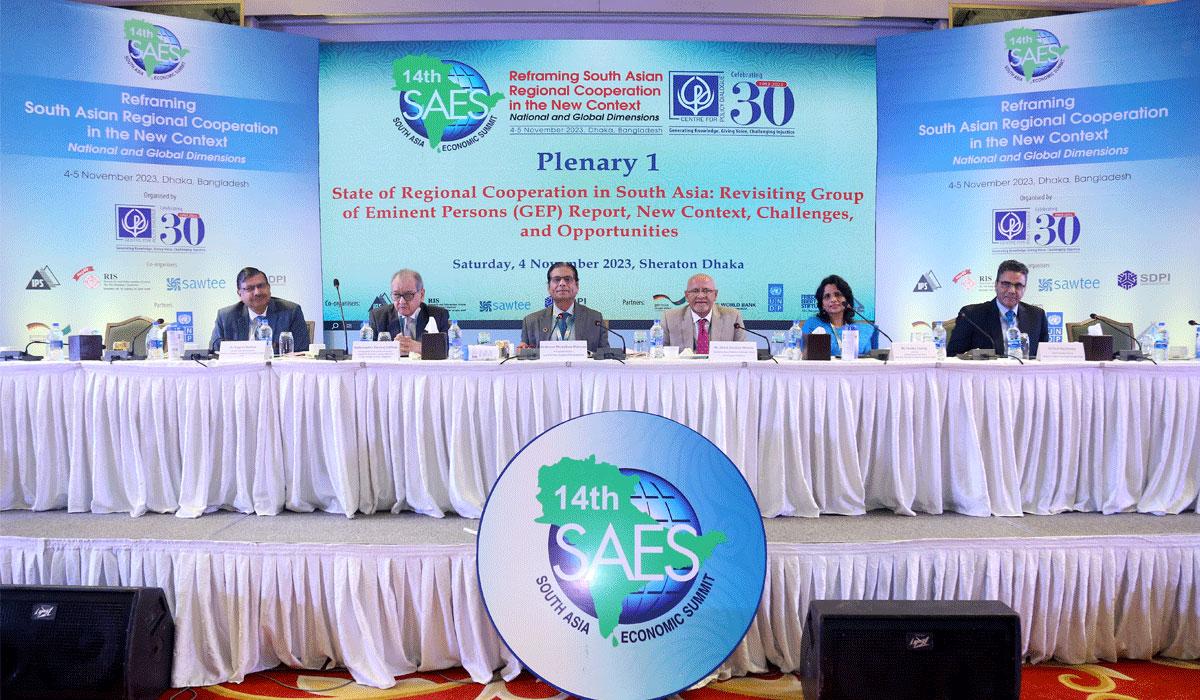
Since the global financial crisis of 2008, world trade has struggled to regain momentum, and international investments have reached a plateau. The current phenomenon, often labeled as ‘slowbalisation,’ reflects a shift from the financial economy and hyper-globalisation to a renewed emphasis on the real economy. Observations highlight the dependence of the productivity paradigm on structural transformation, emphasising the crucial role of the manufacturing sector in generating quality employment opportunities. To drive this transformation, it is imperative to harness the potential of regional value chains, necessitating a focus on reinforcing industrial policies in regional countries.
These are some of the insights that emerged at the first plenary session of the Fourteenth South Asia Economic Summit (SAES XIV) titled ‘State of regional cooperation in South Asia: Revisiting Group of Eminent Persons (GEP) Report, new context, challenges and opportunities’ held on 4 November, 2023 at the Sheraton Hotel, Dhaka.
The Chair of the session, Professor Mustafizur Rahman, Distinguished Fellow, Centre for Policy Dialogue (CPD), said ‘The 1999 GEP Report aimed to make South Asian Association for Regional Cooperation (SAARC) similar to the European Union in terms of trade and economic integration. However, these ambitions did not fully materialise’.
‘Connectivity, trade and transport facilitation are the primary obstacles hindering the realisation of South Asia’s full trade potential. Significant progress is needed in these areas to unlock the region’s trade capabilities’ emphasised Dr Nagesh Kumar, Director and Chief Executive, Institute for Studies in Industrial Development (ISID), India.
While discussing the issues related to SAARC, Ambassador Farooq Sobhan, Distinguished Fellow & Board Member, Bangladesh Enterprise Institute (BEI) and Former Foreign Secretary, Bangladesh, highlighted ‘The persistent challenge with SAARC over the years has been the issue of implementation. The organisation’s success often fluctuates based on the state of Indo-Pak relations and the personalities involved.
Ms Mandakini Kaul, Regional Coordinator, South Asia Regional Integration and Engagement, The World Bank, underscored that the elevated trade and infrastructure expenses had created a situation where it is more costly for companies in Bangladesh to engage in trade with neighboring countries than with countries such as Brazil or others located farther away.
‘We should not hold SAARC hostage to inter-governmental differences. It was the initiative of the people, not governments’ opined Mr Abdul Ghufran Memon, Federal Secretary, Ministry of Maritime Affairs, Government of Pakistan.
Ms Irosha Cooray, Director, Education Security & Culture, SAARC, said ‘We are awaiting guidance from the member states, and we expect to hold the SAARC summit as soon as possible.’
‘The SAARC charter already includes provisions for sub-regional cooperation and acknowledges its importance’ said Dr Posh Raj Pandey, Senior Economic Advisor, Ministry of Finance, Government of Nepal.
Dr Debapriya Bhattacharya, Distinguished Fellow, CPD, participated in the open floor discussion and recommended ‘Whether a new Group of Eminent Person’s report is necessary to consolidate the lessons of the past—what has worked and what has not—requires an evidence-based approach’.
The speakers in the session engaged in discussions surrounding the aspirations outlined in the GEP Report and deliberated on issues that have surfaced over the past 15 years. They expressed that SAARC should not be hindered by intergovernmental differences. They also highlighted the example of the Association of Southeast Asian Nations (ASEAN), where, despite bilateral tensions among member states, collaboration endures toward common goals.
Emphasising regional cooperation’s benefits, the suggestion was to initiate pilot projects that, when successful, can be scaled up. Collaboration with technical institutions to leverage their expertise and resources was encouraged. Furthermore, sub-regional cooperation could concentrate on areas such as trade facilitation, connectivity, and disaster management.
Given the current context, the creation of a new GEP is deemed essential. The proposed GEP should take into account lessons from the past, conducting an evidence-based assessment to discern what has worked and what has not. This approach aims to inform and guide future initiatives for effective regional cooperation and development.
High-level policymakers, political leaders, academics, development practitioners, civil society activists from Bangladesh and the South Asian region attended the conference and shared their valuable insights.
- Concept Note
- Programme
- Presentations
– Cooperation in Public Health – Rudra Suwal
– Cross-Border Labour Flows in South Asia: An Overview – Raghav Chakravarthy
– Macroeconomic Policy Choices in South Asia: Ideas and Choices – Dr. Priyadarshi Dash
– Role of Knowledge Actors in Advancing a New Political Settlement in South Asia – Sanjib Baruah
– Towards an Integrated Energy Grid – Dr. Shankar Shrestha - Session Guidelines
– Plenary Session 1 | Plenary Session 2 | Plenary Session 3
– Parallel Session A1 | Parallel Session A2 | Parallel Session A3
– Parallel Session B1 | Parallel Session B2 | Parallel Session B3
– Parallel Session C1 | Parallel Session C2 | Parallel Session C3 - Speeches
– Welcome Remarks by Dr Fahmida Khatun
– Speech by Dr. Nandalal Weerasinghe
– Speech by Dr Paras Kharel
– Speech by Dr Yuba Raj Khatiwada
– Conference Summary by Dr Khondaker Golam Moazzem - Webpost
Inaugural Session | Plenary Session 1 | Parallel Session A1 | Parallel Session A2 | Parallel Session A3 | Plenary Session 2 | Plenary Session 3 | Parallel Session B1 | Parallel Session B2 | Parallel Session B3 | Parallel Session C1 |Parallel Session C2 | Parallel Session C3 | Closing Session - Photos of the Conference
Inaugural Session | Plenary Session 1 | Parallel Session A1 | Parallel Session A2 | Parallel Session A3 | Plenary Session 2 | Plenary Session 3 | Parallel Session B1 | Parallel Session B2 | Parallel Session B3 | Parallel Session C1 | Parallel Session C2 | Parallel Session C3 | Closing Session | Cultural Programme - Videos of the Conference
Inaugural Session | Plenary Session 1 | Parallel Session A1 | Parallel Session A2 | Parallel Session A3 | Plenary Session 2 | Plenary Session 3 | Parallel Session B1 | Parallel Session B2 | Parallel Session B3 | Parallel Session C1 | Parallel Session C2 | Parallel Session C3 | Closing Session | Cultural Programme


